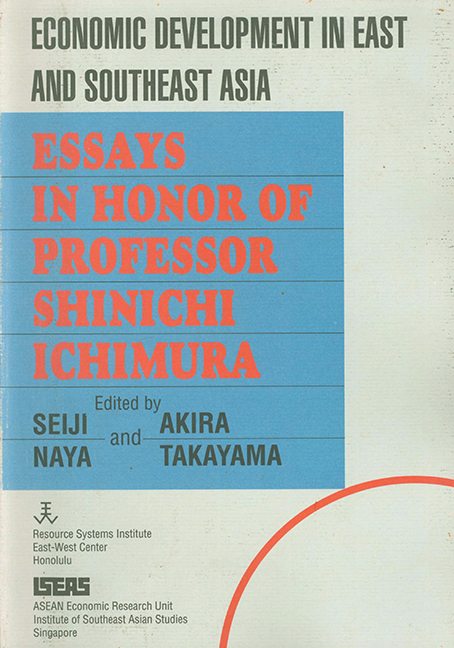Book contents
- Frontmatter
- Preface
- Shinichi Ichimura, 1925-
- CONTENTS
- Introduction
- Contributors to This Volume
- I Structural Change and Economic Development in Developing Asia in the 1990s
- II Explaining the Success of the Four Little Dragons: A Survey
- III Taiwan's Economic Miracle: A Singaporean Perspective
- IV Singapore's Experience of Industrial Restructuring: Lessons for the Other Asian NIEs
- V Korean Industrial Policies for Declining Industries
- VI Vietnam: Recent Economic Developments and the World Economy
- VII Transition from Import Substitution to Export Expansion: The Thai Experience
- VIII Adjustment Problems of a Small Oil-Exporting Country: Did Indonesia Suffer from the Dutch Disease?
- IX A Quarterly Econometric Model of the Hong Kong Economy
- X The Effect ofRicardian Rent Extracting on Macroeconomic Performance
- XI Direct Foreign Investment and the Economic Development of Korea
- XII Japanese Investment in Thailand: Looking Back and Into the Future
- XIII The Effects of Direct Foreign Investment on Taiwan: A Macroeconometric Investigation
- XIV A Reform of the Foward Foreign Exchange Market and Foreign Exchange Rate Determination Policy in Korea, with Foreign Exchange Policy Experiences of Taiwan
- XV Interest Rate and Foreign Exchange Liberalization in Taiwan in the 1980
- XVI Manifold Dilemmas behind External Debt Management
- XVII Agricultural Growth and Food Imports in Developing Countries: A Reexamination
- XVIII The Transformation of Rural Asia and Economic Development Theory and Policy
- XIX The ASEAN Summit and ASEAN Economic Cooperation
- XX The Role of Developing Countries in the New GATT Round
- XXI The Emerging Global Economy and the Role of the Asian NIEs
- Index
X - The Effect ofRicardian Rent Extracting on Macroeconomic Performance
Published online by Cambridge University Press: 21 October 2015
- Frontmatter
- Preface
- Shinichi Ichimura, 1925-
- CONTENTS
- Introduction
- Contributors to This Volume
- I Structural Change and Economic Development in Developing Asia in the 1990s
- II Explaining the Success of the Four Little Dragons: A Survey
- III Taiwan's Economic Miracle: A Singaporean Perspective
- IV Singapore's Experience of Industrial Restructuring: Lessons for the Other Asian NIEs
- V Korean Industrial Policies for Declining Industries
- VI Vietnam: Recent Economic Developments and the World Economy
- VII Transition from Import Substitution to Export Expansion: The Thai Experience
- VIII Adjustment Problems of a Small Oil-Exporting Country: Did Indonesia Suffer from the Dutch Disease?
- IX A Quarterly Econometric Model of the Hong Kong Economy
- X The Effect ofRicardian Rent Extracting on Macroeconomic Performance
- XI Direct Foreign Investment and the Economic Development of Korea
- XII Japanese Investment in Thailand: Looking Back and Into the Future
- XIII The Effects of Direct Foreign Investment on Taiwan: A Macroeconometric Investigation
- XIV A Reform of the Foward Foreign Exchange Market and Foreign Exchange Rate Determination Policy in Korea, with Foreign Exchange Policy Experiences of Taiwan
- XV Interest Rate and Foreign Exchange Liberalization in Taiwan in the 1980
- XVI Manifold Dilemmas behind External Debt Management
- XVII Agricultural Growth and Food Imports in Developing Countries: A Reexamination
- XVIII The Transformation of Rural Asia and Economic Development Theory and Policy
- XIX The ASEAN Summit and ASEAN Economic Cooperation
- XX The Role of Developing Countries in the New GATT Round
- XXI The Emerging Global Economy and the Role of the Asian NIEs
- Index
Summary
Introduction
Rent-seeking has become a current explanation for the problems of the Philippine economy. But although the actual channels of influence on the Philippine economy have been hypothesized extensively, positive analysis is at an infant stage.
In discussions among mainstream economists in the Philippines, the policy suggestions toward liberalization (i.e., of imports, the financial sector, and exchange-rate setting) are premised on two things. First, it is implicitly held that these liberalizations will permit domestic prices to be more closely aligned with world prices and thereby promote efficiency. Second, it is assumed that these liberalizations will promote competition by destroying special privileges granted by the government. Yet, empirical evidence suggests that the most successful export-oriented developing countries, except for the twentieth century reincarnations of Venice and Florence in Hong Kong and Singapore, have been the most protectionist and laden with distorted internal prices.
Analytically, it can be argued that if rents represent nothing but pure income transfers, then rent-seeking does not inflict distortions in the economy. Moreover, it has been argued that if indeed economic agents are genuinely profit-maximizing, distortionary rents should provide entrepreneurs with the resources they need to improve their efficiency and expand their output (including the motivation to sell overseas) (Rodrick 1988).
Frustrated developing countries, such as the Philippines, also provide a fertile ground for political economy discussions about the nature of underdevelopment. Currently, there is a debate on whether the Philippine economy can be characterized as “capitalist” or “pre-capitalist”. The importance of the discussion originates from the effort to specify development strategies alternative to the ones that have been implemented thus far in the Philippines.
Those who take the position that the Philippines is a capitalist economy take their inspiration from the dependency school and often describe the economy as “peripheral”, “backward”, or “dependent”. According to this view, the Philippine economy was established through the penetration of a “world capitalist system”. Thus, the suggestion that a “socialist” economy is the solution to Philippine underdevelopment is made. As noted in a document at the Second Congress of the Organization for the Development of Social Thought and Practice,
“We have consistently characterized the Philippines as an underdeveloped and dependent capitalist society with remnants of feudalism. The capitalist rather than the feudal sector is the most dynamic aspect of this social system(…)
- Type
- Chapter
- Information
- Economic Development in East and Southeast AsiaEssays in Honor of Professor Shinichi Ichimura, pp. 155 - 168Publisher: ISEAS–Yusof Ishak InstitutePrint publication year: 1990

